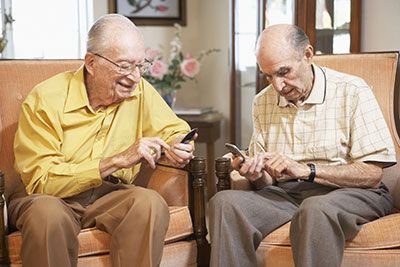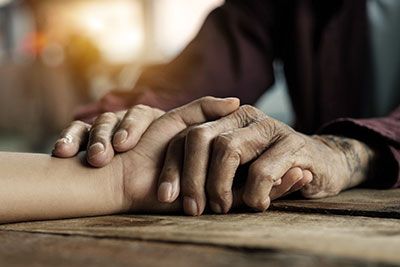Loneliness and social isolation, especially for older adults, is hazardous to your health. More and more people are vulnerable as the population of older Americans - who prefer living independently for as long as possible - continues to grow. However, there are numerous programs and strategies available for seniors to cultivate friendships and participate in activities that overcome their feelings of isolation.
"Nobody seems to care that I live alone in my 70s," writes Judy, letting the world know about her unhappy isolation. "My two adult children and four adult grandchildren are busy living their lives. It's hard to put into words the feelings of loneliness that overcome me."
Judy is one of the many older adults who've shared their thoughts with The Atlantic magazine, which invited readers to sound off about living alone as a senior citizen.
"I give many gifts to my children. Yes, I'm invited to birthday parties and graduations — any celebration requiring a gift — and now I am broke, living off Social Security, fearful I'll soon be homeless," she writes. "I'm lonely and in fear of my immediate future. I have no social contact with others my age. Guess I'm an introvert, lonely and wanting a friend."
Likewise, Brenda, who lives alone in Texas, is depressed and feels abandoned by her family, except for a far-away daughter who makes a weekly phone call.
"My four children are out living their lives. If I died, they would find out two weeks later. My oldest daughter might care. My second daughter wouldn't care. My son might be slightly shocked, but he would get over it quickly," Brenda writes. "My youngest is the only one who shows much care. She calls me every Sunday. She is all I have, so I will love and cherish her from 2,000 miles away."
Is loneliness unhealthy?
The warnings about loneliness and social isolation, based on decades of research and the latest studies, are frightening.

And people like Judy and Brenda are at high risk.
Loneliness and social isolation are as bad for you as obesity, scientists report. They compare the physical damage isolation causes to smoking 15 cigarettes a day and shaving years off of your life. The impact on mental health includes depression and anxiety that often drive people into nursing homes.
Americans are "dying of despair," says Sen. Ben Sasse, R-Neb., ranking loneliness as the nation's "number one health crisis." Loneliness, observes commentator George F. Will, is the nation's "least-understood public-health problem."
Congress continues to invest in programs like Meals on Wheels, rural broadband and transportation services to address the issue. "Just as we did when we made a national commitment to cut smoking rates in this country, we should explore approaches to reducing isolation and loneliness," Senate Aging Committee Chair Susan Collins, R-Maine, urged recently.
Medical experts agree with the politicians and pundits on the severity of the problem.
If you are an older adult, lack a social life and endure a disconnected existence, you face dire consequences, reports former Surgeon General Vivek H. Murthy.
"During my years caring for patients, the most common pathology I saw was not heart disease or diabetes; it was loneliness," Murthy says. "I found that loneliness was often in the background of clinical illness, contributing to disease and making it harder for patients to cope and heal."
Murthy says loneliness results in higher blood pressure, inflammation and a "greater risk of cardiovascular disease, dementia, depression and anxiety." The problem has reached epidemic proportions, he agrees.
Why are we lonely?
For starters, we are living longer and cherish our independence.
The lifespan of Americans has risen dramatically over the decades. Since 1900, our life expectancy has increased from 47 to 79. The Census Bureau predicts that by 2035, one in every five people in the U.S. will be at or above retirement age. That's 78 million people who are in a group susceptible to loneliness.

Half of Americans surveyed say they are lonely, and the average person reports they have just one close friend, according to the American Psychological Association. Nearly 25% of men and 46% of women over age 75 live alone, Census figures show, and that's the way many of them want it.
An AARP survey found that 90 percent of older adults intend to remain at home for as long as possible. As a result, they may live alone for several years after the death of a spouse.
"But this decision also can ultimately lead to social isolation, especially if a spouse, partner or longtime friends or neighbors pass away or leave," MyLifeSite.com reports. "While living solo doesn't always mean that a person will become lonely, it does increase the chances of becoming isolated."
Each person has a unique set of circumstances that contribute to their feelings of being left out, so no two situations are the same. A Kaiser Health News report recently examined some of the general root causes of loneliness. Among them are:
- The perception of being rejected
- Being disappointed in relationships
- The onset of physical limitations
Those suffering from isolation may feel that "other people have rejected you or don't care about you." Their isolation can be reinforced if they "convey negativity or push others away." A lack of self-esteem also is a contributing factor.
Family members and friends become less attentive over time or move away and rarely stay in touch. A lonely person may feel estranged from them and disinclined to reach out.
For older adults, hearing loss is the most common disability and can make people feel disconnected from others. Lack of mobility - such as the inability to walk, drive or easily access transportation - is another contributor to loneliness. Solutions as simple as hearing aids or a helpful person with a vehicle or a community bus service can help to resolve those challenges.
Another factor is that social interactions have changed dramatically with technology. With the internet enabling most goods and services to be ordered from home with a mouse click, there are even more reasons for older adults to stay put, contributing to isolation. Texts and emails are easier than phone calls and actual visits from human beings. Unfortunately, people have opted for convenience over more personalized forms of contact required before the digital age.
How can we cope with loneliness?
- Take mental stock
- Develop social networks and make friends
- Reconsider living alone
- Utilize senior centers and related organizations
- Hobbies and pets help fill the void
- Take advantage of health programs
- Use technology to reach out, not stay home
As a first step, older adults need to reflect on the extent of their loneliness and isolation, suggests Dr. Julianne Holt-Lunstad, an expert on the subject. Evaluate whether your relationships are supportive, she advises. Consider why you don't get together with friends and have lost contact with people. Try to figure out why you're lonely. "When you identify these factors, then you can think about the most appropriate strategies to relive your discomfort and handle any obstacles that are getting in the way," Holt-Lunstad advises.
Experts suggest expanding your circle of friends by volunteering in your community or joining a service or club to find people with the same interests and hobbies. Try participating in workshops or attending church and community events. Find active online communities in your area. Don't be bashful - and take advantage of opportunities to make new friends. When people form friendships later in life, "they are grateful for the capacity to still find warmth, shared values and interests, understanding and trust from former strangers," New York Times reporter Paula Span observed after interviewing older adults about loneliness.
Retirement communities and nursing homes are the "very destinations so many people dread," Span says. However, "they can provide proximity, shared activities and a larger pool of prospective friends." Flo Jakubiak, 85, left her condo in Arizona when she felt herself growing socially isolated. "Nobody there knew I existed," she told Span. Now, in an independent living center, she shares meals, watches movies and play games with new friends. And the more friends you have, the merrier you will be.
Local centers on aging are an excellent resource to make new friends through outings, classes and social functions, advises psychcentral.com. You also may consider being a volunteer through organizations like the RSVP (Retired Seniors Volunteer Program). Local senior centers can provide information on ride-sharing programs, public transportation options and other services.
Hobbies provide motivation and an opportunity to network, develop friendships and share your interests - which can range from gardening to gourmet cooking - with your peers. The companionship of a pet also can help older adults live longer, healthier and happier lives with a renewed sense of purpose.
Health insurance companies, health care systems, senior housing operators and social service agencies have created new initiatives to provide more solutions to the ongoing problem of loneliness. UnitedHealth Group, for example, has announced an initiative to provide "personalized, holistic care" to those enrolled in its Medicare Advantage plans. Health "navigators" are assigned to support those at risk of social isolation.
Technology may make being isolated more convenient, but it also gives us more ways than ever to be connected, at least virtually, and less isolated. Tech companies like Facebook and Google enable users to engage in live video chats. Face-to-face streaming isn't the same as being there, but a virtual visit will help reduce feelings of loneliness, experts say.



